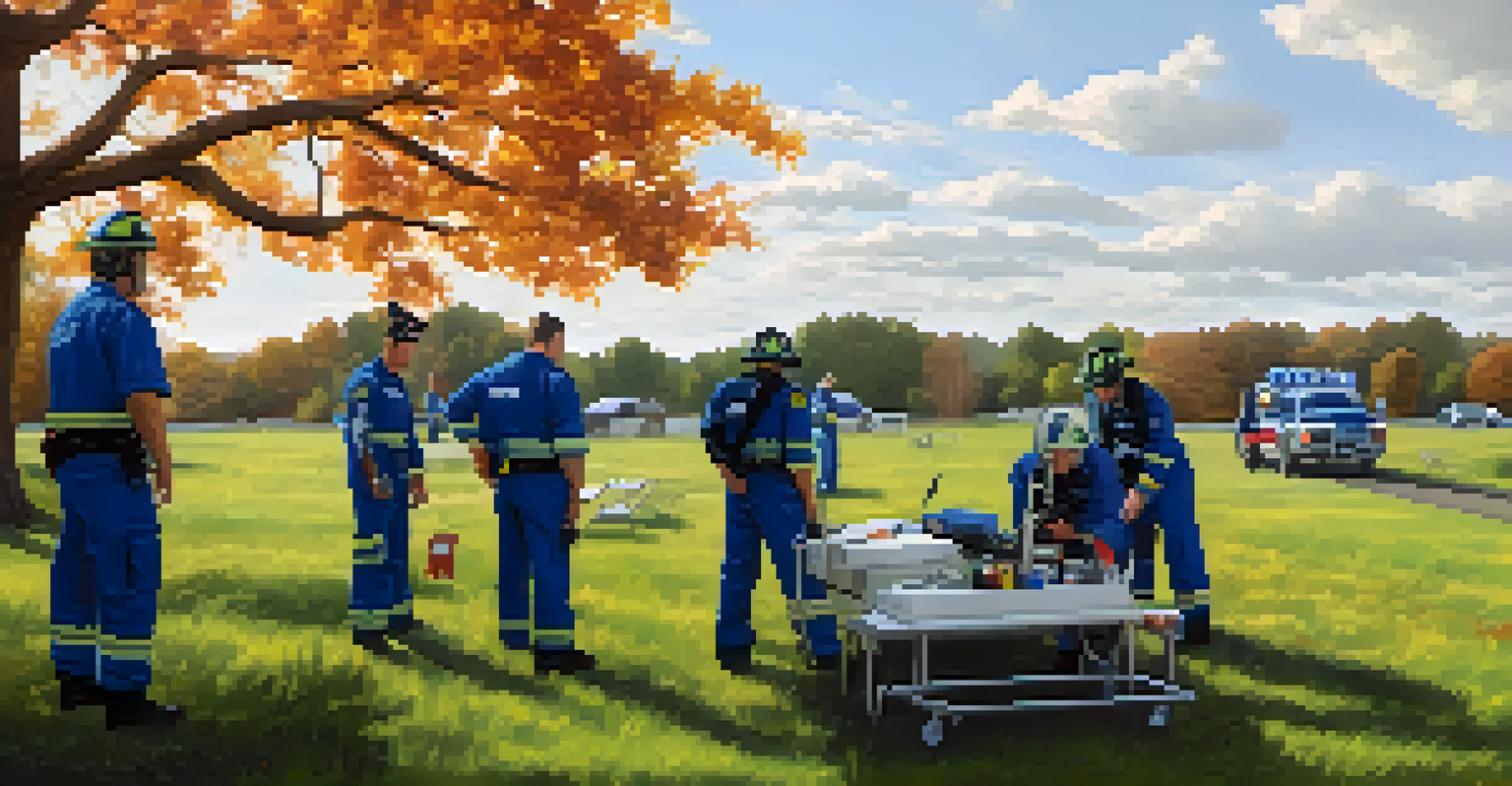Understanding Marijuana's Effects on Emergency Response Teams

The Growing Legalization of Marijuana Across States
In recent years, the legalization of marijuana has gained momentum across various states, leading to significant changes in public perception and usage. More people are using marijuana for both recreational and medicinal purposes, prompting discussions around its effects, especially in high-stakes environments. Emergency response teams often find themselves navigating these changes as they respond to incidents involving marijuana use.
The greatest danger in times of turbulence is not the turbulence; it is to act with yesterday's logic.
This evolving landscape raises important questions about how marijuana impacts the performance of first responders. For instance, when emergency personnel encounter individuals under the influence, their training and decision-making skills may be tested. Understanding the nuances of these interactions is essential for maintaining safety and effectiveness in emergency situations.
Moreover, the legal nuances surrounding marijuana can complicate the actions of emergency responders. It's crucial for these teams to stay informed about local laws and regulations to ensure compliance while providing care. As they adapt to this new reality, effective communication and training become vital components in managing marijuana-related incidents.
How Marijuana Affects Cognitive Function and Response Times
Marijuana is known to affect cognitive functions such as attention, memory, and reaction times. These factors are critical for emergency response teams, where split-second decisions can save lives. For example, a delayed response in assessing a situation could lead to dire consequences, making it essential to understand how marijuana consumption can impair these abilities.

Research indicates that THC, the active compound in marijuana, can lead to decreased psychomotor performance. This is particularly concerning for first responders who must operate vehicles and equipment efficiently. The potential for impaired judgment can not only affect individual responders but also impact the entire team's effectiveness in high-pressure scenarios.
Marijuana's Impact on First Responders
The legalization of marijuana raises concerns about its effects on the cognitive functions and decision-making abilities of emergency response teams.
On the other hand, some studies suggest that moderate marijuana use might not significantly hinder performance for all individuals. However, variability in tolerance and individual responses makes it difficult to draw definitive conclusions. This uncertainty highlights the need for further research and tailored training programs for emergency response teams.
The Psychological Impacts of Marijuana Use on Responders
Beyond cognitive effects, marijuana can influence the psychological state of emergency responders. Stress and trauma are inherent to the job, and some individuals may turn to marijuana as a coping mechanism. While it may provide temporary relief, reliance on marijuana could lead to potential issues like dependency or impaired emotional processing.
In the middle of difficulty lies opportunity.
Emergency responders often work in high-stress environments, facing traumatic situations regularly. This pressure can lead to burnout, anxiety, or depression, making it tempting to seek solace in substances like marijuana. Understanding this dynamic is crucial for team leaders to foster a supportive environment that promotes healthy coping strategies.
Encouraging open conversations about mental health and substance use can help destigmatize these issues within emergency response teams. By providing resources and support, organizations can ensure that their personnel are better equipped to handle the psychological toll of their work without resorting to substances that may impair their performance.
Training and Policies for Responding to Marijuana-Related Incidents
As marijuana becomes more prevalent, emergency response teams must implement training and policies to handle incidents involving its use effectively. This can include recognizing signs of impairment and understanding how to communicate with individuals who may be under the influence. Proper training can equip responders with the knowledge they need to ensure safety and provide appropriate care.
Policy development is equally important. Establishing clear guidelines on how to manage situations involving marijuana can help responders navigate these complex scenarios confidently. These policies should also address the legal implications and outline procedures for documentation and reporting.
Need for Comprehensive Training
Emergency response teams must implement training and policies to effectively manage incidents involving marijuana use and understand its signs of impairment.
Regular training updates and scenario-based exercises can help reinforce these policies and prepare teams for real-world situations. By fostering a culture of continuous learning, emergency response organizations can enhance their effectiveness in dealing with marijuana-related incidents.
The Role of Public Education in Understanding Marijuana Use
Public education plays a critical role in shaping perceptions and behaviors surrounding marijuana use. As more states legalize marijuana, it's essential for communities to understand its effects, especially in the context of emergency situations. Educating the public can help mitigate risks and promote responsible use, ultimately benefiting both responders and the community.
Emergency response teams can collaborate with local organizations to create awareness campaigns. These initiatives can focus on safe consumption practices and the potential risks associated with marijuana use, particularly for vulnerable populations. By engaging with the community, responders can foster a more informed public that understands the implications of marijuana use.
Furthermore, public education can lead to better cooperation between emergency responders and the community. When individuals are well-informed about the effects of marijuana, they may be more inclined to disclose their usage when interacting with responders. This openness can enhance the quality of care provided and ensure that responders can make informed decisions in critical situations.
Case Studies: Marijuana Use in Emergency Situations
Examining real-life case studies can provide valuable insights into how marijuana use impacts emergency response. For instance, there have been instances where first responders encountered individuals under the influence during high-stress situations, such as accidents or medical emergencies. Analyzing these cases helps identify patterns and challenges that responders face when navigating marijuana-related incidents.
In one notable case, a paramedic reported difficulty assessing a patient's condition due to their impaired state from marijuana use. This situation highlights the importance of clear communication and understanding how substances can influence patient interactions. By sharing these experiences, emergency response teams can learn from one another and develop strategies to address similar situations in the future.
Public Education is Essential
Educating the community about marijuana's effects can foster safer practices and improve cooperation with emergency responders during critical situations.
Additionally, case studies can serve as a basis for training programs, allowing responders to engage in discussions about best practices and lessons learned. By integrating real-world examples into their training, teams can better prepare for the complexities of emergency response in a world where marijuana use is increasingly common.
Future Directions for Research and Policy Development
As the landscape of marijuana use continues to evolve, ongoing research is crucial for understanding its effects on emergency response teams. Future studies should focus on the long-term impacts of marijuana use on cognitive function, mental health, and performance in high-stress environments. This research will provide valuable data to inform policies and training programs tailored to the needs of first responders.
Moreover, collaboration between researchers, policymakers, and emergency response organizations can help bridge the gap between science and practice. By sharing findings and insights, these groups can work together to develop evidence-based guidelines that address the challenges posed by marijuana use in emergency situations.

Finally, as public attitudes toward marijuana shift, it's essential for emergency response teams to remain adaptable. By staying informed about the latest research and trends, they can continue to provide safe, effective care while navigating the complexities of marijuana use in their communities.